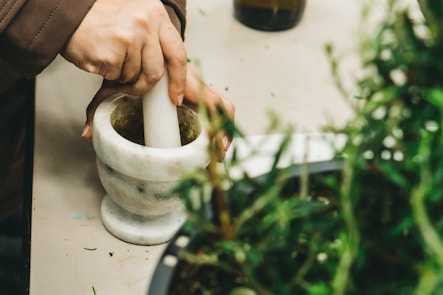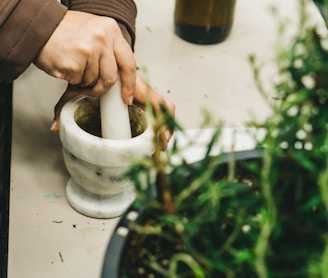ROSEMARY OIL FOR HAIR
How To Use Rosemary For Hair?
BEAUTY
5/21/20236 min read



Rosemary For Hair
Introduction
Rosemary (Rosmarinus officinalis) is a woody, perennial herb with fragrant, evergreen, needle-like leaves. It belongs to the mint family, Lamiaceae, and is native to the Mediterranean region. The plant has been used for centuries for culinary and medicinal purposes, as well as in cosmetics and perfumes.
Rosemary is a hardy plant that can grow up to 6 feet tall and wide, with small, blue, white, pink, or purple flowers that bloom in the spring and summer. Its leaves are densely packed, and the plant has a strong, resinous aroma that intensifies when the leaves are crushed or bruised.
Rosemary is commonly used as a seasoning in Mediterranean cuisine, especially with meat, fish, and roasted vegetables. It is also used in herbal teas, as a natural remedy for various ailments, and in aromatherapy for its invigorating and stimulating properties.
Rosemary has been used for beauty purposes, especially for hair, for centuries. The essential oil that is derived from the rosemary plant is known for its medicinal properties that can help improve hair growth and nourishment.
Here are some of the ways rosemary is used for hair:
1. Stimulates hair growth: Rosemary oil is known for its ability to increase blood circulation in the scalp, which helps to stimulate hair growth. It also contains antioxidants that help to protect the hair follicles from damage.
2. Treats dandruff: The antifungal properties in rosemary oil help to treat dandruff and other scalp conditions. The oil also has antiseptic properties that help to soothe itchy scalp.
3. Strengthens hair: Rosemary oil contains essential vitamins and minerals that help to strengthen hair, making it less prone to damage and breakage.
4. Adds shine: Rosemary oil has natural properties that help to add shine to dull and dry hair.
5. Reduces hair loss: Rosemary oil has been found to reduce hair loss in people suffering from alopecia areata, an autoimmune condition that causes hair loss.
Rosemary can be used in several ways for hair care, such as adding it to shampoos, conditioners, and hair oils. It can also be used as a hair rinse by adding a few drops of rosemary oil to water and applying it to the scalp and hair after shampooing.
HOW TO MAKE ROSEMARY OIL?
Rosemary oil is a popular essential oil that has been used for centuries for its medicinal and culinary properties. This oil is extracted from the leaves of the rosemary plant, which is native to the Mediterranean region, but is now grown in many parts of the world.
Rosemary oil is known for its natural ability to boost hair growth, improve memory, and provide relief from stress and anxiety. In this article, we will explore the many benefits and uses of this powerful essential oil.
Benefits of Rosemary Oil
1. Promotes Hair Growth
One of the most well-known benefits of rosemary oil is its ability to stimulate hair growth. This is because rosemary oil helps to increase circulation to the scalp, which in turn promotes the growth of new hair. Additionally, rosemary oil is high in antioxidants that can help to prevent hair loss and damage.
2. Improves Memory and Concentration
Rosemary oil has been shown to improve memory and concentration. In a study published in the International Journal of Neuroscience, participants who were exposed to rosemary oil demonstrated better cognitive performance than those who were not.
3. Reduces Stress and Anxiety
Rosemary oil has a soothing effect on the mind and body, making it an effective natural remedy for stress and anxiety. Its calming properties can help to reduce the symptoms of anxiety and promote relaxation.
4. Relieves Pain and Inflammation
Rosemary oil has anti-inflammatory and analgesic properties that can help to relieve pain and inflammation in the body. It has been used to treat conditions such as rheumatoid arthritis, sore muscles, and menstrual cramps.
5. Boosts Immune System
Rosemary oil contains antioxidants and antimicrobial compounds that can help to boost the immune system. Its antibacterial properties make it an effective natural remedy for treating infections and preventing illness.
Uses of Rosemary Oil
1. Aromatherapy
Rosemary oil can be used in aromatherapy to promote relaxation and reduce stress and anxiety. It can be diffused in a room or added to a bath for a relaxing and rejuvenating experience.
2. Hair Care
Rosemary oil is commonly used in hair care products because of its ability to stimulate hair growth and improve hair health. It can be added to shampoo or conditioner or used as a scalp massage oil to promote hair growth and prevent hair loss.
3. Cooking
Rosemary oil is widely used in cooking and can be added to dishes to enhance their flavor. It pairs well with meats, potatoes, and vegetables.
4. Skincare
Rosemary oil can be added to skincare products to help improve the appearance of the skin. Its anti-inflammatory properties can help to reduce redness and swelling, while its antimicrobial properties can help to prevent acne and other skin infections.
5. Cleaning
Rosemary oil can be added to cleaning products to provide a natural and effective disinfectant. Its antibacterial and antifungal properties make it an ideal natural cleaning agent.
Precautions While Using Rosemary Oil
While rosemary oil is safe for most people to use, there are some precautions that should be taken. It should not be used during pregnancy or by individuals who have epilepsy. Additionally, it should not be applied directly to the skin without dilution, as it can cause irritation.
The Most Asked Question Is " How To Make Rosemary Oil?" and "How To Make Rosemary Water For Hair?" And the answer is right here:
HOW TO MAKE ROSEMARY OIL?
To make rosemary oil, you will need the following ingredients:
- 1 cup of fresh rosemary leaves
- Carrier oil such as jojoba oil, olive oil or coconut oil
- A clean glass jar with a lid
- Cheesecloth or a fine-mesh strainer
Follow these steps to make rosemary oil:
1. Wash and pat dry the fresh rosemary leaves to remove any dirt or debris.
2. Chop the rosemary leaves into small pieces and place them in a clean, dry glass jar.
3. Pour enough carrier oil over the rosemary leaves to cover them completely. Make sure the jar lid is tightly closed.
4. Store the jar in a cool, dry place for at least 2 weeks, shaking it once a day.
5. After 2 weeks, strain the oil through a cheesecloth or a fine-mesh strainer into a container. Discard the rosemary leaves.
6. You can store the rosemary oil in a clean glass jar with a lid in a cool, dry place, away from sunlight.
Note: The longer you steep the rosemary in the oil, the stronger the scent and properties of the oil will be.
You can use this homemade rosemary oil as a hair treatment, massage oil, or as a natural remedy for various skin and scalp conditions.
HOW TO MAKE ROSEMARY WATER FOR HAIR?
To make rosemary water for hair, follow these steps:
1. In a pot, boil 2-3 cups of water.
2. Add 1 cup of fresh rosemary leaves and stir well.
3. Let the mixture simmer for 20-30 minutes.
4. Turn off the heat and let the mixture cool.
5. Strain the liquid using a sieve or cheesecloth.
6. Pour the rosemary water into a clean spray bottle.
Benefits of using rosemary water for hair:
1. Stimulates hair growth: Rosemary water has been shown to improve hair growth by stimulating hair follicles.
2. Strengthens hair: The antioxidants in rosemary water help to prevent hair damage and breakage, making hair stronger and less prone to damage.
3. Treats dandruff: Rosemary water has antifungal properties that help to treat dandruff and other scalp conditions.
4. Soothes itchy scalp: The anti-inflammatory and antiseptic properties of rosemary water help to soothe itchy scalp and reduce irritation.
5. Adds shine: Rosemary water contains essential oils that can help to add shine and luster to hair.
How To Use Rosemary Water?
To use rosemary water on your hair, first, shampoo your hair as usual, and then spray the rosemary water onto your scalp and hair, working it in with your fingers or a comb.
Leave the rosemary water in your hair for a few minutes before rinsing it off with cool water.
Rosemary water can be used as a hair rinse after shampooing to help strengthen and nourish hair, promote hair growth, and reduce dandruff and inflammation on the scalp. It can also be used as a natural remedy for itchy scalp or to add shine to dull hair. Use rosemary water once or twice a week to see the best results.
Conclusion
Rosemary has been used for centuries as a natural remedy for hair health. This fragrant herb is known for its ability to stimulate hair growth, prevent hair loss, and improve overall scalp health. Rosemary oil, which is extracted from the leaves of the plant, can be applied directly to the hair and scalp to nourish and moisturize. It also has antimicrobial properties that can help to eliminate dandruff and other scalp conditions. The use of rosemary for hair can make your locks look shinier, thicker, and healthier. Incorporating rosemary into your hair care routine is easy and can be done by adding a few drops of essential oil to your shampoo or conditioner, or by making a hair rinse using fresh rosemary leaves.
Rosemary oil is a versatile essential oil with many benefits and uses. It can be used to promote hair growth, improve memory and concentration, reduce stress and anxiety, relieve pain and inflammation, and boost the immune system. Whether you add it to your hair care, skincare, or cooking routine, rosemary oil is a powerful natural remedy that can help to improve your overall health and well-being.


